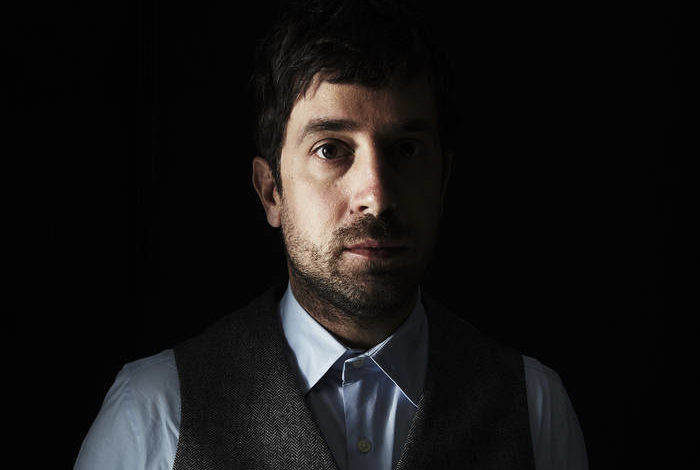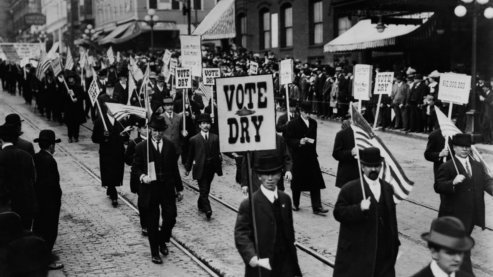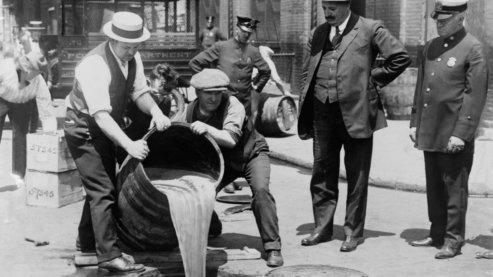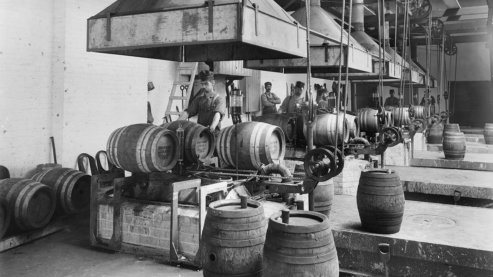Music in the Film
There are over 100 pieces of music in Prohibition – from nineteenth century hymns to the Tin Pan Alley songs of Irving Berlin to Jazz greats from Louis Armstrong, Benny Goodman, Duke Ellington, the Mills Brothers and Bix Beiderbecke. Florentine Films was also fortunate to collaborate once again with the incomparable Wynton Marsalis and his band as well as guitarist, composer and singer Doug Wamble, who has worked on Florentine projects for the past decade.
Florentine Films was also pleased to work with composer David Cieri again on this film. Read an interview with David, below.
Composer/Musician David Cieri Talks About the Music of Prohibition:

How did you begin working with Ken Burns and Florentine Films?
In 2008, I was playing piano five afternoons a week at this very David Lynchish style hotel with no restaurant or bar (just two precariously functioning elevators) in NYC. As I made my way back to the piano from a break, there were two little girls sitting at the piano collaborating on some very interesting sounds together. Whenever I get wind of inspired creating, I always want to be a part of it, so I asked if I could join them in their search at the keyboard and so the three of us were suddenly dialoging or triologuing I suppose with each other – 30 fingers on a piano! Well as it turns out, these two wonderfully brilliant and imaginative girls, Allie and Haley, are the daughters of Erik Ewers who is an editor at Florentine Films. We had a great conversation about music and afterward, as he was leaving with his family, he left me his business card. My first assignment for Florentine was to create a version of Joplin's "Leola" for The National Parks: America's Best Idea. From the recording booth in NYC I played my rendition of "Leola" for Erik and a few other editors over the phone for them up in Walpole. After the recording was finished playing, Erik, after a long pause, said "that's not gonna cut it" and my heart sank immediately, and then the room in Walpole all started laughing with the inside joke…instant relief. "Leola" was just an extension of all of the days that I had been with music and loved on music since I was a little kid. The difference was that now I was being received (and received by Ken and Florentine Films – a group that I had admired for so long and continue to admire) which is an incredible gift as a human being – to be seen – to be heard.
What is your method for composing music for the films?
Riding my bicycle in NYC has taught me a lot about composing. At every block I have to re evaluate my relationship to everything around me for it is in constant motion – in hyper rapid flux. Similarly, I don't have a preset approach to writing music because music and the way it manifests is never sedentary. Buckminster Fuller talked about god being a verb. Sound is the same for me in that music is constantly evolving, tuning, moving, changing and becoming. Music is a verb, in this sense for me, which precludes any set method for composing. I do have some guideposts that I like to keep around though. Music for film, in a general sense, is music with a hole in it. The hole is occupied by the visual imagery – the subject. The music works as a counterpart and a complement to the visual subject by surrounding it. Imbuing it with mood and feeling. I like to get to know the subject in as many different ways as I can.
Which composers inspire you?
At the moment, I feel very inspired by Ernst Reijseger. He is a cellist from Holland and a member of a very inspirational group called the ICP (Improvisors Collective Pool). I recently went to see Werner Herzog's Cave of Forgotten Dreams and was, and continue to be, heavily moved by Reijseger's score. I hear him developing intricate spaces in his music – sometimes it sounds like he is playing in a monstrous silo and in the same composition he sounds like he is playing in a tiny attic. My father was an architect and my mother is a musician and they were always talking about creating spaces, be it aural or physical. My father would talk about things like – if the room feels cold it will appear larger and if it feels warm, it will feel smaller. How does the shape of a room change with sound then? Ernst, to my ears, is very aware of this synesthesia and uses it to great effect through his utilization of things like speed, density, viscosity, translucence, etc…of sound. On top of all this, his music is so personal, so filled with risks and full of human feeling. Frank Lloyd Wright talks about "seeing inward and seeing from within outward". I hear this personal approach in Reijseger's music, in his playing, and it re awakens my imagination.
Which scene from Prohibition did you enjoy writing for most?
I loved writing for the temperance film scene in episode one. It's a short film in the episode, which is propagandizing the supposed evils of drinking. In the beginning, these guys are running around town in a frenzy and they finally end up in a bar, where a glass gets thrown and unbeknownst to the group, the daughter of one of the men is present and she gets hit with the thrown glass and passes out. Mayhem ensues as she is brought home all knocked out. The mother is losing it and the father goes into this possessed dervish withdrawal from drinking and remorse. I composed "The Chase" to this scene and it was fun to explore the limits with the piano so as to augment the mayhem. It's an interesting exercise in music to think of the ways to flirt with the limits of the composition. How fast and how far can I drive this car before it completely falls apart? That's what scoring for this scene felt like. It is fun to find the limits of existence in safe ways. Maybe it's why we love rollercoasters and horror movies. Perhaps we are discovering more about our inner shapes by searching out our outer boundaries. By the end of the scene, I am playing wild whirlpool like arpeggios which are about to break apart so as to illuminate the active quicksand that having a drink will get you into as espoused by this short story. Hilarious and amazing fun!



